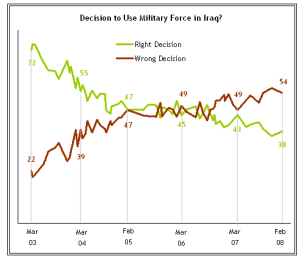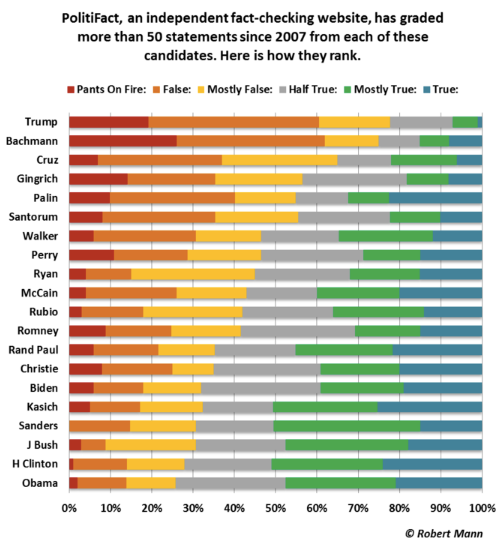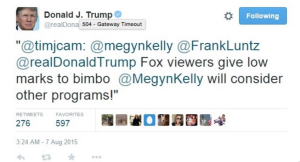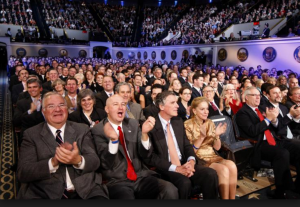 Watching the news coverage of the Republican presidential campaign, you get the feeling that there is a wave of support for the ideas of leading Republican candidates like Donald Trump, Ben Carson, Ted Cruz and Marco Rubio. For example, Talking Points Memo recently reported:
Watching the news coverage of the Republican presidential campaign, you get the feeling that there is a wave of support for the ideas of leading Republican candidates like Donald Trump, Ben Carson, Ted Cruz and Marco Rubio. For example, Talking Points Memo recently reported:
GOP Campaign Official to Senate Candidates: Ride That Trump Wave
The Republican Party is preparing Senate candidates for the very real possibility that Donald Trump could be the party’s presidential nominee.
According to a seven-page memo obtained by the Washington Post, National Republican Senatorial Committee Executive Director Ward Baker is encouraging Senate candidates to understand Trumpmentum, use it to their advantage, and then ignore Trump’s most bombastic positions.
But is there really a national wave in support of the positions of Trump and the other extremely conservative contenders? Remember, only about one-third of the general election electorate votes in Republican primaries, so even front runner Trump is only winning about 31% of one-third the overall electorate. So, yes, Trump is riding a wave of sorts, but it is still a relatively modest wave on a relatively small pond.
Ideological Wave?
So, in the midst of all of this Republican primary coverage, it’s important to keep an eye on what the nation as a whole — as opposed to the narrow slide of Republican primary voters — thinks of the positions of the Republican contenders. Public opinion surveys show that there is no wave of support for most of their extremely conservative positions.
- Americans oppose deportation of undocumented immigrants. While bombast about mass deportation of immigrants fueled Trump’s rise to the top of the Republican heap, Gallup finds that only 14% of Americans support deporting all undocumented immigrants to their home country. Among the Independent voters Republicans need to persuade in order to win in November, only 19% support such deportation. In the general election, this position is a liability, not an asset.
- Americans oppose repealing the Affordable Care Act (ACA). Every major Republican candidate wants to repeal the ACA, and primary voters love them for it. But among all Americans, a November 2015 Kaiser survey finds that 42% either want to expand the ACA (26%) or keep it as is (16%), while only 30% support the Republicans candidates’ repeal position.
- Americans oppose tax cuts for the wealthy and corporations. Every major candidate’s tax proposal dramatically cuts taxes for the wealthiest Americans and corporations. But an April 2015 Gallup survey finds that 62% of Americans say that upper income people pay too little in taxes, not too much. The same survey found that 69% of Americans think that corporations are paying too little in taxes. Americans want to increase taxes on the wealth and corporations, while Trump, Carson, Cruz and Rubio all want to cut them. Again, in the general election, this position will be a leg iron for the Republican nominee.
- Americans want stricter gun control laws. Every major Republican candidate opposes stricter gun control laws, a wildly popular position at Republican rallies. But an August 2015 Pew survey finds that Americans actually overwhelming support a wide range of stricter gun control laws. For instance, there is huge support for background checks for gun shows and private sales (85% support), laws to prevent the mentally ill from obtaining guns (79% support), a federal database to track gun sales (70% support), and a ban on assault-style weapons (57% support).
So for the most part, the Republican candidates’ ideas are extremely unpopular with the Americans who will pick the next President less than a year from now.
The Anti-Democratic Wave
But there is one major exception to this trend, and it’s a very significant one. According to a November 2015 ABC News/Washington Post poll, battling terrorism is currently the second most important issue to Americans. It ranks just behind the economy, and ahead of health care, immigration and tax policy. On that issue, a majority of Americans are much more aligned with Trump, Carson, Cruz and Rubio than they are with Clinton and Sanders.
- Americans want military intervention to counter terrorism. In the direct aftermath of the Paris terrorist assaults, an NBC News poll finds that 65% of Americans want to send troops to fight ISIS in Iraq and Syria. Also, 58% believe that “overwhelming military force is the way to defeat terrorism,” while only 38% believe that “too much military force creates hatred that only leads to more terrorism.” Similarly, Democrats have a losing position when it comes to Syrian refugees, with 56% of Americans opposed to increasing the number of Syrian refugees in the nation.
 In other words, the national mood is much like when America rushed into the Iraq War in 2003. Pew found that public support for that military action was 72% in 2003, but ultimately decreased to 38% by the end of the war.
In other words, the national mood is much like when America rushed into the Iraq War in 2003. Pew found that public support for that military action was 72% in 2003, but ultimately decreased to 38% by the end of the war.
While Vice President Dick Cheney estimated that war would cost about $80 billion and end quickly, the last Iraq War lasted seven years and the nonpartisan Congressional Budget Office says it cost about $1.9 trillion, or about $6,500 per American. The human toll for America was also high – 4,487 American troops died and at least another 32,226 were seriously wounded. Still, almost three-fourths of Americans are ready to do it all over again.
Overall, this notion of a Trump wave is not supported by public opinion data. Americans are not buying most of what Trump and the other Republican contenders are selling. But if the election becomes dominated by the need to combat terrorism with military interventions, such as if there are a steady stream of ISIS attacks, Democrats could be in big trouble.


 Maybe that’s because reporters are worried bullying candidates will give them the Megyn Kelly Treatment/Rebecca Quick Treatment. Maybe it’s because reporters don’t take the time to learn policy issues. Maybe it’s because reporters don’t respect voters’ intelligence enough to think that they will care about, or understand, policy issues
Maybe that’s because reporters are worried bullying candidates will give them the Megyn Kelly Treatment/Rebecca Quick Treatment. Maybe it’s because reporters don’t take the time to learn policy issues. Maybe it’s because reporters don’t respect voters’ intelligence enough to think that they will care about, or understand, policy issues Watching the news coverage of the Republican presidential campaign, you get the feeling that there is a wave of support for the ideas of leading Republican candidates like Donald Trump, Ben Carson, Ted Cruz and Marco Rubio. For example,
Watching the news coverage of the Republican presidential campaign, you get the feeling that there is a wave of support for the ideas of leading Republican candidates like Donald Trump, Ben Carson, Ted Cruz and Marco Rubio. For example,  In other words, the national mood is much like when America rushed into the Iraq War in 2003.
In other words, the national mood is much like when America rushed into the Iraq War in 2003.  If I were a political party chair, I would make one simple adjustment to make my party more competitive. I would only allow general election swing voters to attend candidate debates.
If I were a political party chair, I would make one simple adjustment to make my party more competitive. I would only allow general election swing voters to attend candidate debates.